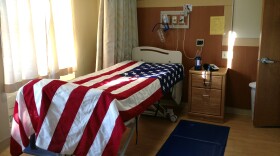
Quil Lawrence
Quil Lawrence is a New York-based correspondent for NPR News, covering veterans' issues nationwide. He won a Robert F. Kennedy Award for his coverage of American veterans and a Gracie Award for coverage of female combat veterans. In 2019 Iraq and Afghanistan Veterans of America honored Quil with its IAVA Salutes Award for Leadership in Journalism.
Lawrence started his career in radio by interviewing con men in Tangier, Morocco. He then moved to Bogota, Colombia, and covered Latin America for NPR, the BBC, and The LA Times.
In the Spring of 2000, a Pew Fellowship sponsored his first trips to Iraq — that reporting experience eventually built the foundation for his first book, Invisible Nation: How the Kurds' Quest for Statehood is Shaping Iraq and the Middle East (Bloomsbury, 2009).
Lawrence has reported from throughout the Arab world and from Sudan, Cuba, Pakistan, Israel, Gaza, and the West Bank. He covered Iraq and Afghanistan for twelve years, serving as NPR's Bureau Chief in Baghdad and Kabul. He covered the fall of the Taliban in 2001, the invasion of Iraq in 2003, the second battle of Fallujah in 2004, as well as politics, culture, and war in both countries.
In 2012, Lawrence returned to the U.S. to cover the millions of men and women who have served at war, both recently and in past generations. NPR is possibly unique among major news organizations in dedicating a full-time correspondent to veterans and the Department of Veterans Affairs.
A native of Maine, Lawrence studied history at Brandeis University, with concentrations in the Middle East and Latin America. He is fluent in Spanish and conversant in Arabic.
-
After scandals around veterans waiting too long for care in 2014, Congress pushed through a $10 billion fix to get those vets care, fast. Now it's almost unanimous: The fix is broken.
-
"For my PTSD issues, jail is the least therapeutic atmosphere you could ever imagine," says Iraq veteran David Carlson. "You come in one way and you leave three times worse."
-
In 2009, then-Veterans Affairs head Eric Shinseki declared that all homeless veterans would have housing by 2015. New Orleans has made big strides, but in Los Angeles, the problem persists.
-
As the generation that served in World War II and Korea grows older, the demand on the Department of Veterans Affairs for end-of-life care is growing with them. Now, the VA is trying new ways to help.
-
Veterans in some rural areas have to travel hundreds of miles on empty interstates to get health care, losing a day of work or sometimes two. A new program lets them see nearby doctors instead.
-
President Obama addressed the annual convention of the American Legion in North Carolina with a raft of new proposals for vets.
-
There's overmedicating and self-medicating, but some vets are "de-medicating." Prescribed multiple drugs to deal with PTSD and pain, they've stopped taking them — without authorization.







